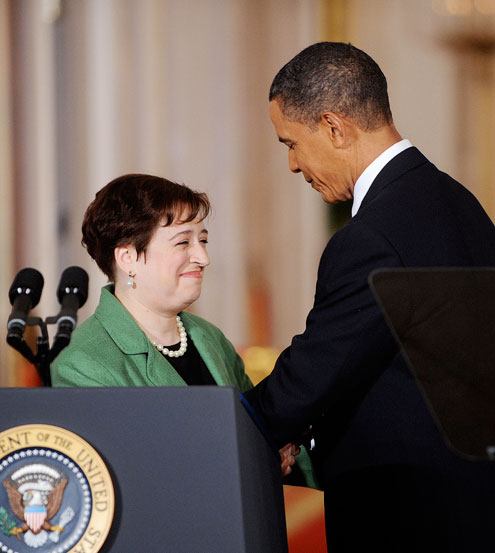“Simply amazing.”
Supreme Court Justice Elena Kagan penned those two words in an email to a former Harvard colleague on the day the House of Representatives passed Obamacare in March 2010.
The email’s subject line said it all: “Fingers and toes crossed today!”
Like clockwork, when Obamacare was signed into law, the floods of legal challenges to the health care measure began piling up on court dockets, signaling the inevitability of a Supreme Court ruling on the bill’s constitutionality.
Kagan’s support for the law came as no surprise to anyone in the West Wing. After all, her job as then-Solicitor General was to represent the federal government before the nation’s highest court.
As members of the Obama administration began developing strategies to defend the health care law in court, it was revealed that Kagan wanted her office involved in the planning.
Records show that Kagan was involved in a series of emails that discussed how to handle the mounting legal challenges.
Not long after, President Obama was presented with filling a vacancy on the Court left by retiring Justice John Paul Stevens.
Answering the numerous calls to put forward a woman, Obama nominated Kagan to fill the seat. After a slightly testy confirmation process, Kagan joined the Court in August of 2010 – a mere five months after her voiced support of the passage of Obamacare.
As the health care bill’s constitutionality challenge has finally made it to the Supreme Court, Kagan is now turning a deaf ear to watchdog groups by refusing to recuse from participating in the case.
Federal law explicitly states that federal judges must recuse themselves if they have “served in governmental employment and in such capacity participated as counsel, advisor or material witness concerning the proceeding or expressed an opinion concerning the merits of the particular case or controversy.”
Another key provision requires federal judges to recuse from a case if their “impartiality might reasonably be questioned.” However, the final decision for recusal is left solely to the individual justice.
A similar call for recusal has been asked of Justice Clarence Thomas, whose wife has significant ties to anti-Obamacare advocacy groups. Like Kagan, Thomas continues to ignore legitimate notions of bias by the public.
While Thomas could argue that he has personally never taken a stand on the issue, the mere appearance of bias should cause impartiality to be reasonably questioned.
Kagan and Thomas should both recuse themselves from the Obamacare review to affirm our nation’s commitment to a fair and impartial judicial review.
Kagan, a perceived liberal justice, and Thomas, a relatively conservative justice, would theoretically cancel the other out in votes for or against the law.
The U.S. Supreme Court has long been an institution of the highest honor and a true symbol of America’s commitment to a strong and empowered judicial system. It is an institution where the politics of Washington are checked at the door and the rule of law supersedes any notion of bias.
The justices’ refusal to recuse from the review is shameful and displays conduct unbecoming of the high standards to which the justices are sworn to uphold.
As the Supreme Court’s final decision on Obamacare is expected in June, all nine justices have been involved in the preliminary procedures for the hearing.
Justices Thomas and Kagan must uphold their dedication and oath to our legal system and respectfully recuse from the long-awaited Obamacare review.
Austin Gaddis is a junior majoring in communication studies and public relations. His column runs on Thursdays.









